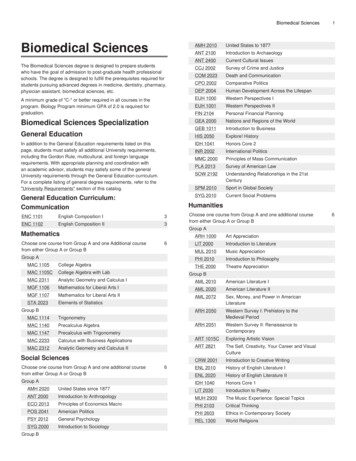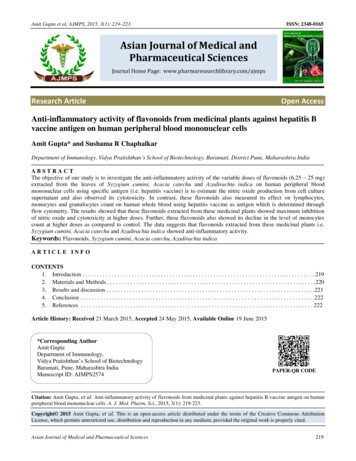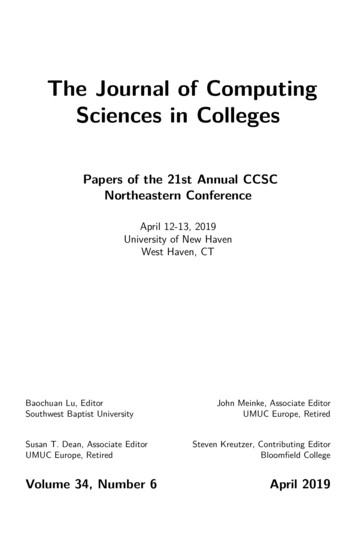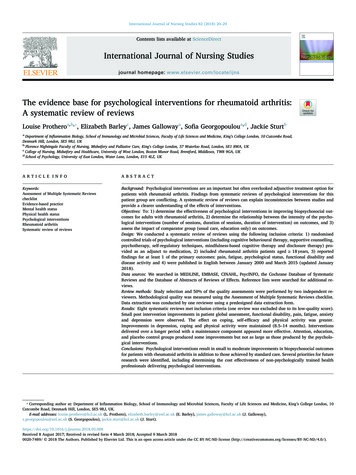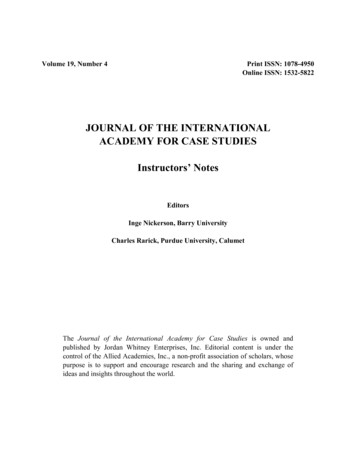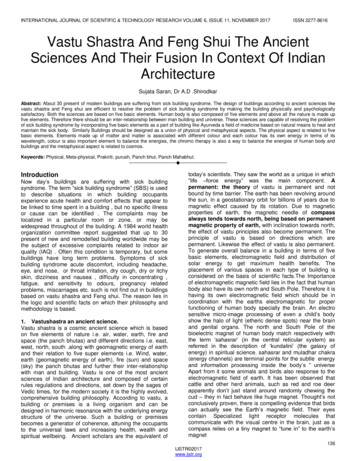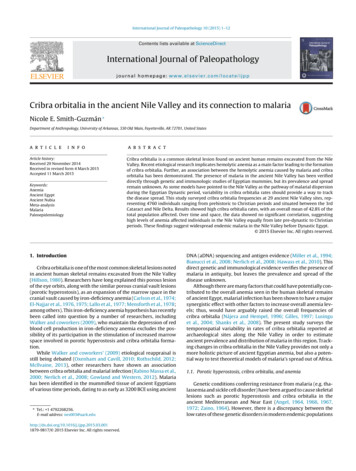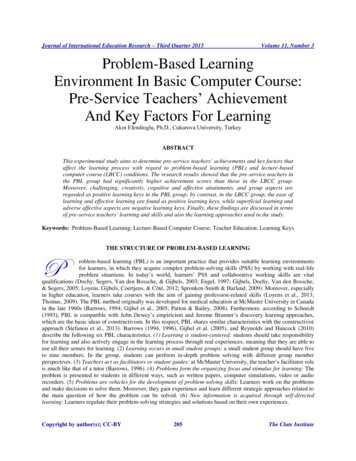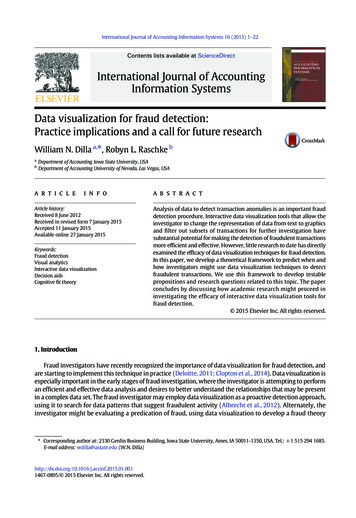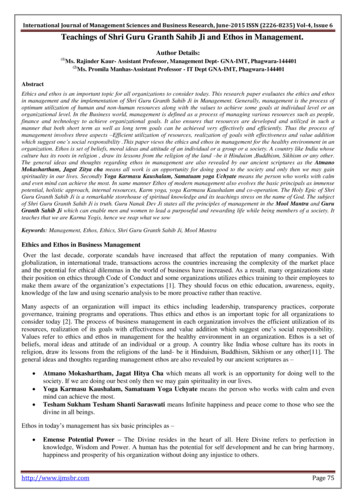
Transcription
International Journal of Management Sciences and Business Research, June-2015 ISSN (2226-8235) Vol-4, Issue 6 Teachings of Shri Guru Granth Sahib Ji and Ethos in Management.Author Details:(1)Ms. Rajinder Kaur- Assistant Professor, Management Dept- GNA-IMT, Phagwara-144401(2)Ms. Promila Manhas-Assistant Professor - IT Dept GNA-IMT, Phagwara-144401AbstractEthics and ethos is an important topic for all organizations to consider today. This research paper evaluates the ethics and ethosin management and the implementation of Shri Guru Granth Sahib Ji in Management. Generally, management is the process ofoptimum utilization of human and non-human resources along with the values to achieve some goals at individual level or anorganizational level. In the Business world, management is defined as a process of managing various resources such as people,finance and technology to achieve organizational goals. It also ensures that resources are developed and utilized in such amanner that both short term as well as long term goals can be achieved very effectively and efficiently. Thus the process ofmanagement involves three aspects –Efficient utilization of resources, realization of goals with effectiveness and value additionwhich suggest one’s social responsibility .This paper views the ethics and ethos in management for the healthy environment in anorganization. Ethos is set of beliefs, moral ideas and attitude of an individual or a group or a society. A country like India whoseculture has its roots in religion , draw its lessons from the religion of the land –be it Hinduism ,Buddhism, Sikhism or any other.The general ideas and thoughts regarding ethos in management are also revealed by our ancient scriptures as the AtmanoMokashartham, Jagat Zitya cha means all work is an opportunity for doing good to the society and only then we may gainspirituality in our lives. Secondly Yoga Karmasu Kaushalam, Samatuam yoga Uchyate means the person who works with calmand even mind can achieve the most. In same manner Ethos of modern management also evolves the basic principals as immensepotential, holistic approach, internal resources, Karm yoga, yoga Karmasu Kaushalam and co-operation. The Holy Epic of ShriGuru Granth Sahib Ji is a remarkable storehouse of spiritual knowledge and its teachings stress on the name of God. The subjectof Shri Guru Granth Sahib Ji is truth. Guru Nanak Dev Ji states all the principles of management in the Mool Mantra and GuruGranth Sahib Ji which can enable men and women to lead a purposeful and rewarding life while being members of a society. Itteaches that we are Karma Yogis, hence we reap what we sowKeywords: Management, Ethos, Ethics, Shri Guru Granth Sahib Ji, Mool MantraEthics and Ethos in Business ManagementOver the last decade, corporate scandals have increased that affect the reputation of many companies. Withglobalization, in international trade, transactions across the countries increasing the complexity of the market placeand the potential for ethical dilemmas in the world of business have increased. As a result, many organizations statetheir position on ethics through Code of Conduct and some organizations utilizes ethics training to their employees tomake them aware of the organization‟s expectations [1]. They should focus on ethic education, awareness, equity,knowledge of the law and using scenario analysis to be more proactive rather than reactive.Many aspects of an organization will impact its ethics including leadership, transparency practices, corporategovernance, training programs and operations. Thus ethics and ethos is an important topic for all organizations toconsider today [2]. The process of business management in each organization involves the efficient utilization of itsresources, realization of its goals with effectiveness and value addition which suggest one‟s social responsibility.Values refer to ethics and ethos in management for the healthy environment in an organization. Ethos is a set ofbeliefs, moral ideas and attitude of an individual or a group. A country like India whose culture has its roots inreligion, draw its lessons from the religions of the land- be it Hinduism, Buddhism, Sikhism or any other[11]. Thegeneral ideas and thoughts regarding management ethos are also revealed by our ancient scriptures as – Atmano Mokashartham, Jagat Hitya Cha which means all work is an opportunity for doing well to thesociety. If we are doing our best only then we may gain spirituality in our lives.Yoga Karmasu Kaushalam, Samatuam Yoga Uchyate means the person who works with calm and evenmind can achieve the most.Tesham Sukham Tesham Shanti Saraswati means Infinite happiness and peace come to those who see thedivine in all beings.Ethos in today‟s management has six basic principles as – Emense Potential Power – The Divine resides in the heart of all. Here Divine refers to perfection inknowledge, Wisdom and Power. A human has the potential for self development and he can bring harmony,happiness and prosperity of his organization without doing any injustice to others.http://www.ijmsbr.comPage 75
International Journal of Management Sciences and Business Research, June-2015 ISSN (2226-8235) Vol-4, Issue 6 Holistic Approach – It is based on the principle of unity, oneness where each and every particle is connectedwith every other particle.Equal Importance to Subjectivity/Objectivity – Ethical values such as courage, vision, truth, socialawareness etc are subjective. These are as important as money, materials or data. Our body, senses, mind,intellect etc are objective. Hence Wisdom manager is much more important and valuable than a knowledgemanager.Karma Yoga – It is all about identifying our priorities and trying to achieve them. Karma Yoga is not onlymeant for the common man but also for leaders and managers who if act responsibly will in turn influence thebehavior of a number of people. So Karma Yoga is good for self-purification, self-development, collectivegrowth and welfare, perfection, all round happiness and prosperity.Yogah Karmasu Kaushalam – Yoga means excellence at work, Kaushalam means doing work withdevotion. Such attitude enhances its value and improves the concentration and skills of a worker. In TotalQuality Management, Yogah Karmasu Kaushalam provides valuable contributions.Co-operation – As per Indian ethos, co-operation is a powerful motive for team work. Co-operation, unitedefforts and striving for success leads to all round prosperity and success in any field of human expertise.Golden Rule of EthicsThe Golden Rule, also known as the Ethic of Reciprocity [15]. It says to treat others the way you want to be treated.1.2.3.4.5.6.7.Always think before you speak. So if you would not want any harsh words said to you, then do notsay them to others.Always think before you act. So if you would not want to experience bad effects, then do not subjectthem to others.Practice self-control. If you would not want people having temper tantrums around you, then do nothave temper tantrums around others.Practice courtesy. If you find others behaviors unacceptable then do not rude to others.Develop patience. If you find it unpleasant when people are impatient with you then do not beimpatient with others.Always listen to others when they speak.Always help others. If you are in such a position that you need help of someone else then do whateveryou can to assist the other person.Thus executives, managers and employees should focus on ethics education and prepare themselves to make the bestpossible decisions.Review of LiteratureHimadri Barman[15] focus on Quality of work-life and work ethics in Total quality Management, Karma Yoga, valueoriented Holistic management and Indian value system.According to Dr N MuthuMohan[8 ], Guru Granth Sahib Ji and Thirukural are scriptures which speak about God, aCastless society social and ethical values.Erik W, Resley[4] suggests that the Janamsakhis produces moral life-worlds and represent an invaluable ethicalresource for individuals. They can easily access and relate to the Sakhis from different angles, different sociallocations and different interpretive strategies.Oriana Negulescu and Elena Doval[8 ] examined the main principles and possible ethical problems that might occurinto a management and suggest that employees should be devoted to their profession, constantly improve theirknowledge, team spirit, responsibility and honesty towards institution.Hosmer[6,7] points out that ethics must be included within management, in order to build a set of beliefs that are validfor all employees in a firm to generate a cooperative, innovative and strategically directed effort for the success of theinstitution.Dobson [ 3] states that the existence of non ethical culture will lead to changes which will stem from economic needsand not for ethical ones.http://www.ijmsbr.comPage 76
International Journal of Management Sciences and Business Research, June-2015 ISSN (2226-8235) Vol-4, Issue 6A view of Sri Guru Granth Sahib JiSri Guru Granth Sahib Ji is a holy Granth of Sikhs. It is an anthology of prayers and hymes which contain the actualwords and verses as uttered by the Sikh Gurus. As Guru Nanak Dev Ji said,jYsI mY AwvY Ksm kI bwxI qYsVw krI igAwnu vy lwlo ]Jaisee Maain Aawe Khassam Kee Baani Tessrha Karree Giaan Ve Lalo]Means as comes to me the Lord‟s word, so I deliver it, O Lalo.The Sri Guru Granth Sahib Ji, also known as Adi Granth consist of 1430 pages and 5864 Sri Guru Granth Sahib Ji is aholy Granth of Sikhs. It is an anthology of prayers and hymes which contain the actual words and verses as uttered bythe Sikh Gurus. As Guru Nanak Dev Ji verses. Its contents are referred as Bani or Gurbani and individual hymes asShabad. The Granth was compiled by the Fifth Guru, Guru Arjan Dev Ji. He undertook the enormous task ofcollecting, compiling and scrutinizing the hymes and compositions of Guru Nanak Dev Ji and his predecessors. Healso decided to include the hymes of other saints. One of the most distinctive features of Guru Granth Sahib Ji is that itis the first religious book which contains the writings of the saints belonging to different religions, castes and diverseregions of the country. Guru Granth Sahib Ji incorporates and sanctifies the writings of the holy men of different faith.Therefore the language of Shri Guru Granth Sahib Ji is a mixture of almost all Aryan languages, yet it is writtenexclusively in Gurmukhi script.According to Sharomani Gurudwara Parbandhak Committee(SGPC) Granth Sahib Ji contains compositions of the firstfive Gurus, the ninth Guru, fifteen Bhagats (Jai Dev, Nam Dev, Trilochan, Parmanand, Sadna, Ramanand, Beni,Dhanna, Pipa, Sain, Kabir, Ravidas, Farid, Surdas, Bhikhan) and eleven Bhattas (Mathra, Jalap, Harbans, Talya,Salya, Bhal, Kulh Sahar, Nal, Kirat, Gayand, Sadrang). Guru Granth Sahib contains 5894 hymns. The number ofstanzas according to Pinchot is 15575. 974 hymns are written by the first Guru, 62 by the second Guru, 907 by thethird, 679 by the fourth, 2218 by the fifth, and 115 by the ninth. Among the remaining 922 hymns of Bhagats, thehighest number of hymns (541) is by KabirWhen the Granth is compiled, Guru placed it in the newly built temple „HARMINDER SAHIB‟ popularly known asThe Golden Temple in Amritsar. The first „Parkash‟ means opening ceremony was performed in the Golden Templeby Guru Arjan Dev ji on August 30, 1604.The Guru acknowledging the Adi Granth as higher authority than a personand posses that no one sat at a level above the Granth Sahib. He also nominated Bhai Buddha ji as the custodian ofthe Granth Sahib. With the passage of time, the original Granth passed on from Guru Arjan Dev ji to Guru HargobindSahib ji and then to Dhir Mal, grandson of Guru Arjan Dev ji. When tenth Guru Gobind Singh ji send his men to thedescendent of Dhir mal to return the Granth for restoring it, they refused to part with it and ask Guru Gobind Singh jito write his own Granth if he was a real Guru. Therefore, the second version of Granth sahib was prepared by GuruGobind Singh ji in 1706 at Damdama Sahib. Here Guru Gobind Singh ji dictated The Granth Sahib from his memoryto Bhai Mani Singh ji and it was same word by word as it originally was. At this time Guru Granth Sahib Ji re-editedthe Adi Granth to the form in which we find it today. Guru Gobind Singh Ji added the Shabads of the 9th Guru, GuruTeg Bahadur Ji and one shalok of his own in the Adi Granth. Before Guru Granth Sahib ji passed away, he bestowedthis version of The Granth as the final and everlasting „Guru‟. He declared that after him, the next „Guru „ would beGuru Granth Sahib ji and he said, whosoever longs to meet God, find the way in the Shabads mentioned in Sri GuruGranth Sahib ji.The subject of Guru Granth Sahib ji is truth. As Guru Nanak Dev ji states in the Mool Mantra that God is the ultimatetruth. We also have to cultivate those qualities which are associated with him. Though its-teachings, the Granth canenable all man and women to lead a purposeful and rewarding life while being members of a society. It seeksuniversal peace and good of all mankind. There is not a single word in Sri Guru Granth Sahib ji that might bederogatory to any belief or religion. It also stresses on democratic way of life and equality of all people. The mainemphasis is on moral actions, noble living and working for the welfare of all beings. It remains as a permanentunchangeable guide for all as a „living Guru‟.The Guru considered divine worship through of music is the best way of attaining a state of bliss. Therefore, each ofthe hymes is noted with the melody and rhythm (Raga) to which it is to be sung or read. There are 31 musical ragas inGuru Granth Sahib composed to suit various moods[14].Management values from Shri Guru Granth Sahib Ji and Mool Mantra:http://www.ijmsbr.comPage 77
International Journal of Management Sciences and Business Research, June-2015 ISSN (2226-8235) Vol-4, Issue 6Shri
Yogah Karmasu Kaushalam – Yoga means excellence at work, Kaushalam means doing work with devotion. Such attitude enhances its value and improves the concentration and skills of a worker. In Total Quality Management, Yogah Karmasu Kaushalam provides valuable contributions.
